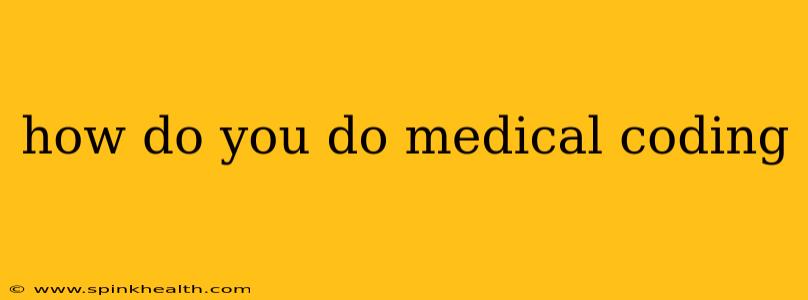How Do You Do Medical Coding? A Journey into the World of Healthcare Data
The world of healthcare is complex, a whirlwind of diagnoses, procedures, and treatments. But behind the scenes, a critical process ensures that all this information is accurately translated into a universal language understood by insurance companies, hospitals, and government agencies: medical coding. It’s a fascinating field, demanding precision and attention to detail, and this guide will walk you through the essentials.
Imagine being a translator, but instead of languages, you're translating medical terminology into numerical and alphanumeric codes. That's essentially what a medical coder does. They take complex medical records – doctor's notes, lab results, diagnostic images – and transform them into standardized codes that represent specific medical services, diagnoses, and procedures. These codes are crucial for billing, reimbursement, data analysis, and public health research.
What are the main types of medical coding?
There are two primary systems of medical coding:
-
ICD Codes (International Classification of Diseases): These codes describe diagnoses, symptoms, and reasons for a patient's visit. Think of them as the "what" of a patient's medical encounter. The most recent version, ICD-10-CM, uses alphanumeric codes (e.g., A00.0 for Cholera due to Vibrio cholerae).
-
CPT Codes (Current Procedural Terminology): These codes represent the medical, surgical, and diagnostic services performed on a patient. They are the "how" of a patient's treatment. CPT codes are numerical (e.g., 99213 for an established patient office visit). HCPCS (Healthcare Common Procedure Coding System) codes are also used, often for supplies and equipment not covered under CPT.
These coding systems are updated regularly to reflect advances in medicine and technology, requiring coders to stay current with the latest changes.
How do you become a medical coder?
The path to becoming a certified medical coder typically involves:
-
Education: Formal training is highly recommended, whether through a certificate program, associate's degree, or bachelor's degree. Many community colleges and vocational schools offer programs in medical coding and billing. Online programs are also available.
-
Certification: While not always mandatory, obtaining a certification demonstrates proficiency and increases job prospects. Well-regarded certifications include the Certified Professional Coder (CPC) offered by the American Academy of Professional Coders (AAPC) and the Certified Coding Specialist (CCS) offered by AHIMA (American Health Information Management Association).
-
Experience: Internships or entry-level positions are often crucial in gaining hands-on experience and building your skill set.
What are the key skills needed for medical coding?
To excel as a medical coder, you'll need:
-
Medical terminology: A strong grasp of medical terms and abbreviations is essential for understanding the information contained within medical records.
-
Anatomy and physiology: Basic knowledge of the human body and its functions is helpful in interpreting medical reports accurately.
-
Coding guidelines: You must be meticulous in following the coding guidelines set by the organizations that maintain the coding systems (e.g., AMA for CPT, WHO for ICD).
-
Attention to detail: Accuracy is paramount. Even a small error in coding can have significant financial and legal consequences.
-
Analytical skills: You'll need to carefully analyze medical records to select the most appropriate codes.
What is the difference between medical coding and medical billing?
While closely related, medical coding and billing are distinct roles:
- Medical coders translate medical records into codes.
- Medical billers use those codes to create and submit claims to insurance companies.
What are the career prospects for medical coders?
The demand for medical coders is consistently high due to the ever-growing healthcare industry and the increasing importance of accurate medical recordkeeping. The field offers opportunities for both remote work and in-office positions.
The journey into medical coding demands dedication and precision, but for those who enjoy detail-oriented work and find fulfillment in contributing to the efficiency of healthcare systems, it's a rewarding career path. It's a profession that keeps pace with the latest medical advancements, making it continually engaging and challenging.

